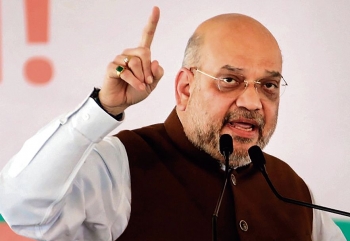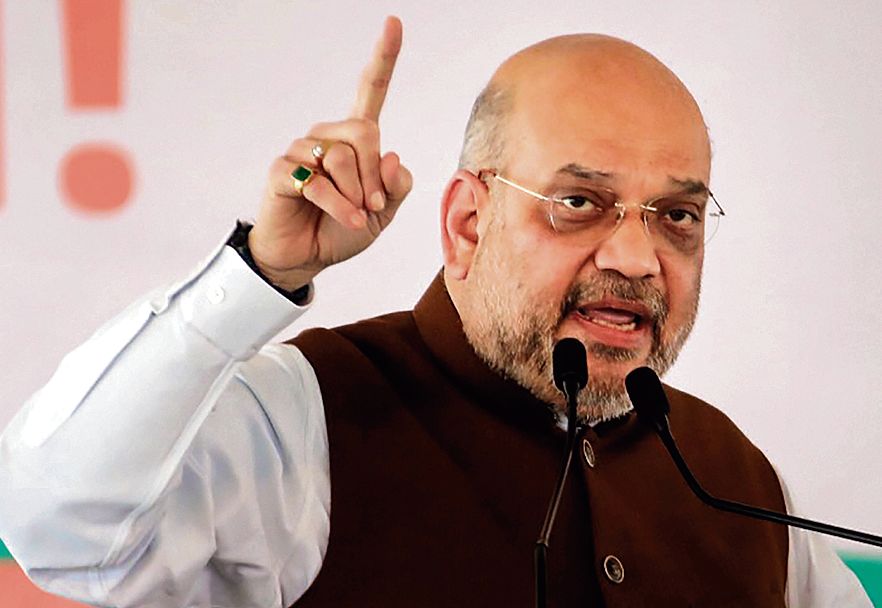
.jpg) Mathew John
Mathew John

In Mary Shelley’s novel by that name, Frankenstein created a monster in a laboratory over a two-year period, based on an abstruse but deadly effective scientific principle, and this bogeyman (always a ‘man’) went on to wreak death and destruction wherever he went. I was reminded of this macabre tale as the results of the Gujarat Assembly elections were trumpeted across the country last week.
More than two decades ago during Vajpayee’s reign, the country first witnessed planned, targeted violence against minorities, with Gujarat as the epicentre. The now forgotten VHP leader, Praveen Togadia then proudly proclaimed Gujarat as the laboratory of Hindutva -- the gospel of majoritarianism. That was the time when there were coordinated attacks on Muslims and Christians -- assaults on their places of worship, burial grounds, schools, gatherings and businesses -- accompanied by the boastful refrain: “Now that our government is in power, we can do what we want.”
But the constraints of coalition politics, the outcry from still independent constitutional bodies and media, and the benign persona of Vajpayee hampered, to an extent, the vigilante squads let loose by the Hindu Dharma Jagran Manch (HJM). The indignation and uproar over the attacks on minorities forced Vajpayee, in January 1999, to visit Dangs, the hotbed of violence against minorities, and order punitive action against erring government officials. Unlike today, there was considerable resistance to majoritarian bigotry at that time, prompting the VHP leader, Giriraj Kishore, to lament that “the Hindu agenda was limping on crutches.”
Gujarat has travelled a long way. The double-engine ruling dispensation has dropped even the pretence of being secular or of honoring the country’s composite culture. Having captured the collective Hindu consciousness, it now flaunts Hindutva with a swagger. There is an unabashed State-sponsored assertion of Hindu identity and the cancelling out of the minorities, particularly Muslims.
At an election rally a few days before Gujarat went to the polls, Amit Shah justified the horrific happenings in Gujarat in 2002, belligerently stating that “they (?) were taught such a lesson that since then the state has not witnessed a single case of communal violence,” cunningly targeting a community without elaborating who “they” were. My God, the Home Minister of the country was not only extolling evil, but sowing hatred of one’s fellow countrymen to garner votes! It is important to note his choice of locale when making this most inflammatory, cynical evaluation of the darkest period in our recent history. On 22nd November, he was appealing to the electorate to support the BJP candidate, Payal Kukrani, whose father was convicted in the horrific massacre of Bilkis Bano’s family during the genocidal killings in Gujarat in 2002. By nominating her, the ruling party, defying ordinary decency and ethics, conveyed the message that the killers were men of honour!
In a world of unremitting barbarities, we need to be reminded of what happened to Bilkis Bano’s family in those hellish days of national disgrace and infamy in 2002 that claimed over 1900 lives and resulted in widespread destruction of homes and property, mostly Muslim. Bilkis Bano, then 19 years old, was attacked and gang-raped by a mob as were her mother and two sisters. As she lay battered and bleeding on the floor, the brutes took a stone and smashed the head of her infant daughter Saleha, for which act alone they deserved death and eternal damnation! Bilkis lost 14 members of her family that day. Such spine-chilling, gruesome butchery played out across Gujarat during that period of horrendous savagery.
The heroic Bilkis, despite heartbreak that would have killed even the doughtiest, and undeterred by having to change her home numerous times just to escape being silenced, fought for justice and with rock-like support of activists such as Teesta Setalvad, succeeded in securing the conviction in 2008 of the 11 men guilty of the gang-rape and murder of members of Bano’s family. The convictions restored hope in our secular democracy and the foundational principle that the law would be applied equally to all, irrespective of the religious stripes one wears. We dared to hope that it would bring a closure to the nightmare spawned by Gujarat 2002 and that Hindus and Muslims would once again live together in peace. But it was hoping against hope in a milieu where the most daunting political leviathan ever in this country, whips up hate to win elections!
How we respond to tragedy reveals our national character, our community culture and most importantly, our humanity. Today, the murderous hate and distrust between communities have hardened, fomented by a formidable cultural outfit and its political surrogate. Hindutva’s gospel of belligerent homogeneity and exclusion have assertively settled in the innards of the nation. The whole lot of institutions – the bureaucracy, the law-enforcement agencies, even the judiciary -- have become choir boys of the saffron ensemble.
Look at what has transpired in the momentous Bilkis Bano case. The eleven savages who raped, ravaged and destroyed the Bano family were all released from jail, significantly on 15th August this year even as the PM thundered on about ‘nari shakti’ from the ramparts of the Red Fort. While the advertised official version has it that the out-of-turn release of the convicts was ordered by the Gujarat government, under its remission policy, the Supreme Court actually facilitated the release by directing the State government to consider the remission petition in terms of its policy of 1992 that was in force on the date of conviction, and not on the basis of the state government’s revised policy of 2014 which bars out-of-turn release of prisoners convicted for rape and murder. Had the extant policy been invoked, the accused would have been ineligible for remission of sentence. Have no doubt, the entire operation was choreographed by the Centre in a well-coordinated ‘jugalbandi’!
Symbols are a microcosmic simulacrum of a country’s history, culture and worldview. A devastating example of symbolism heralding the consecration of the Hindu Rashtra was the recent effacement of the Mahatma’s image from a flyover located right in front of Ahmedabad’s Gujarat Vidyapith university which he had established, and its replacement with Veer Savarkar’s portrait. In the new saffron-tainted India, the icon of secular humanism has been supplanted by the patron saint of Hindutva. It was no surprise that at the over-the-top victory celebrations in Delhi, and the swearing-in of the new government in Gujarat, the presence of a clutch of holy men in saffron robes on the dais was emphatic assertion that religion would be commandeered to gain temporal power and that the religious identity of the majority community is what matters in today’s India.
We seem to have lost the power of compassion and common humanity. The aspirational India envisioned in that magnificent poem, “Let My Country Awake” by Rabindranath Tagore lies in tatters. Written before Independence, it is an inspiring manifesto of hope for every Indian, brimming with optimism at the the sheer promise and possibilities for the future. The poem is also a universal declaration of camaraderie “where the world has not been broken up into fragments by narrow domestic walls….”
Our present state is a grim contradiction of what our greatest bard envisaged, hence this dire parody (with apologies to Gurudev):
“Where the mind cringes in fear and the head is bent low;
Where knowledge is powerless.
Where the world lies in broken fragments wrecked by the canker of hate.
Where words spring from the depths of chicanery.
Where unrelenting strife reaches out to perdition.
Where the murky stream of vicious unreason has become an ugly habit.
Where the mind is constricted by bigoted thought and action.
From this hell of iniquity, my father, let my country awake!”
At this benighted, hopeless time, if there ever was a bootless cry, the concluding line is it!
(The writer is a former civil servant. Views are personal)